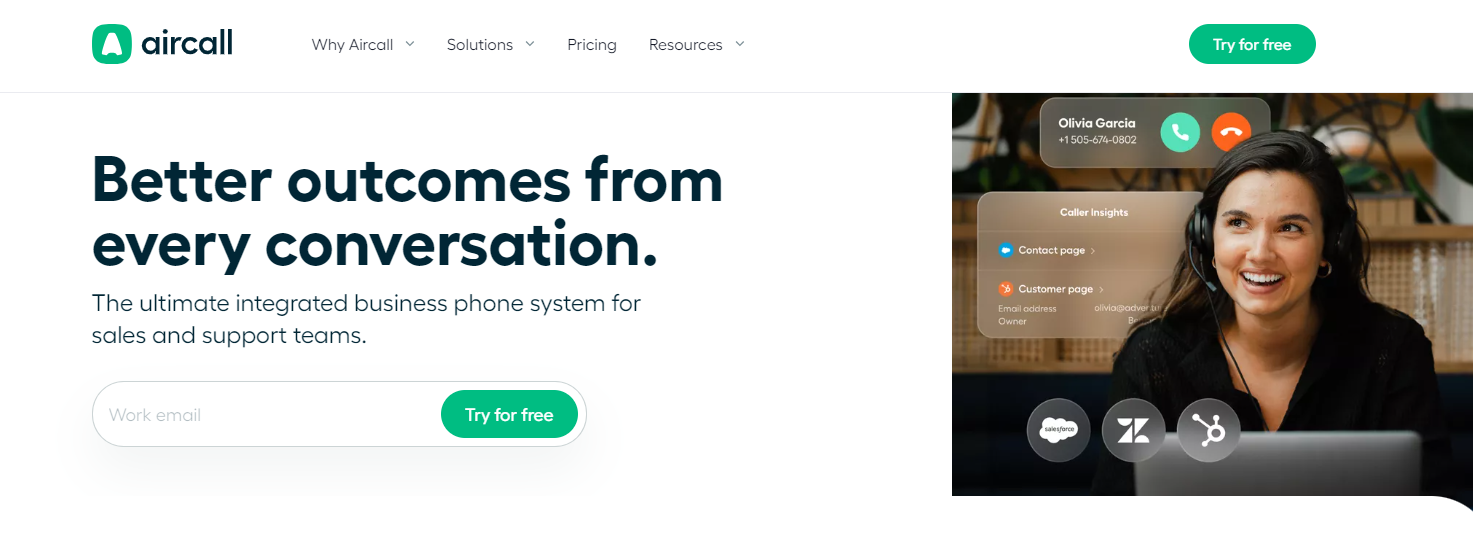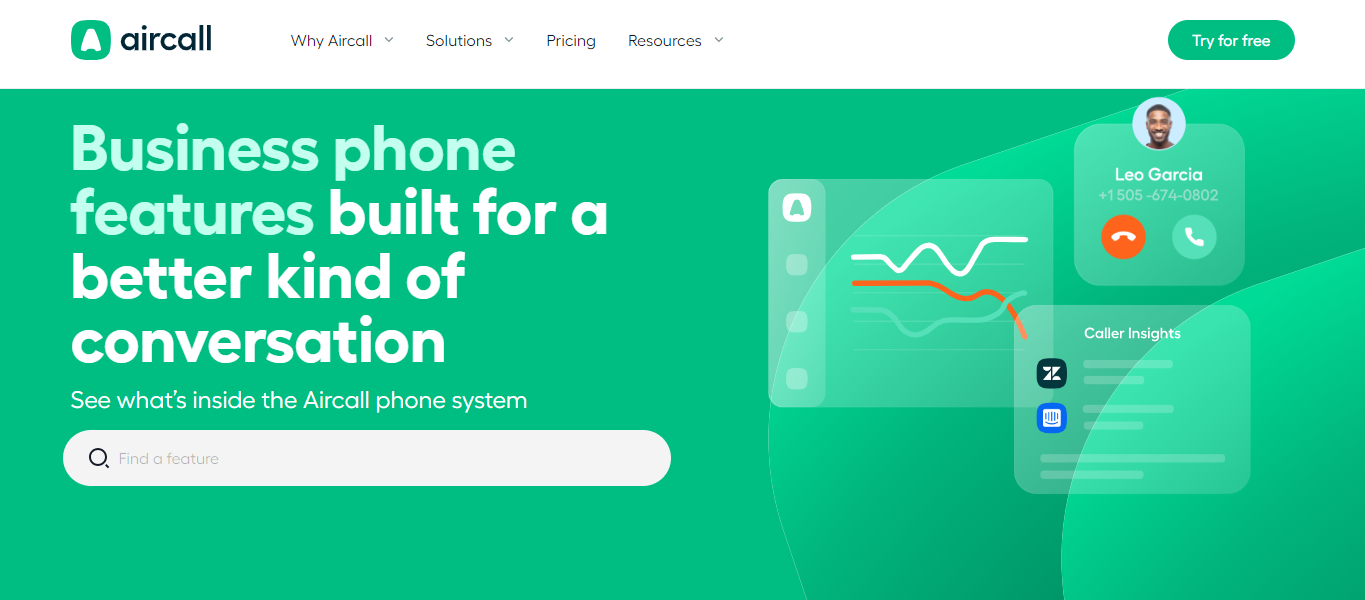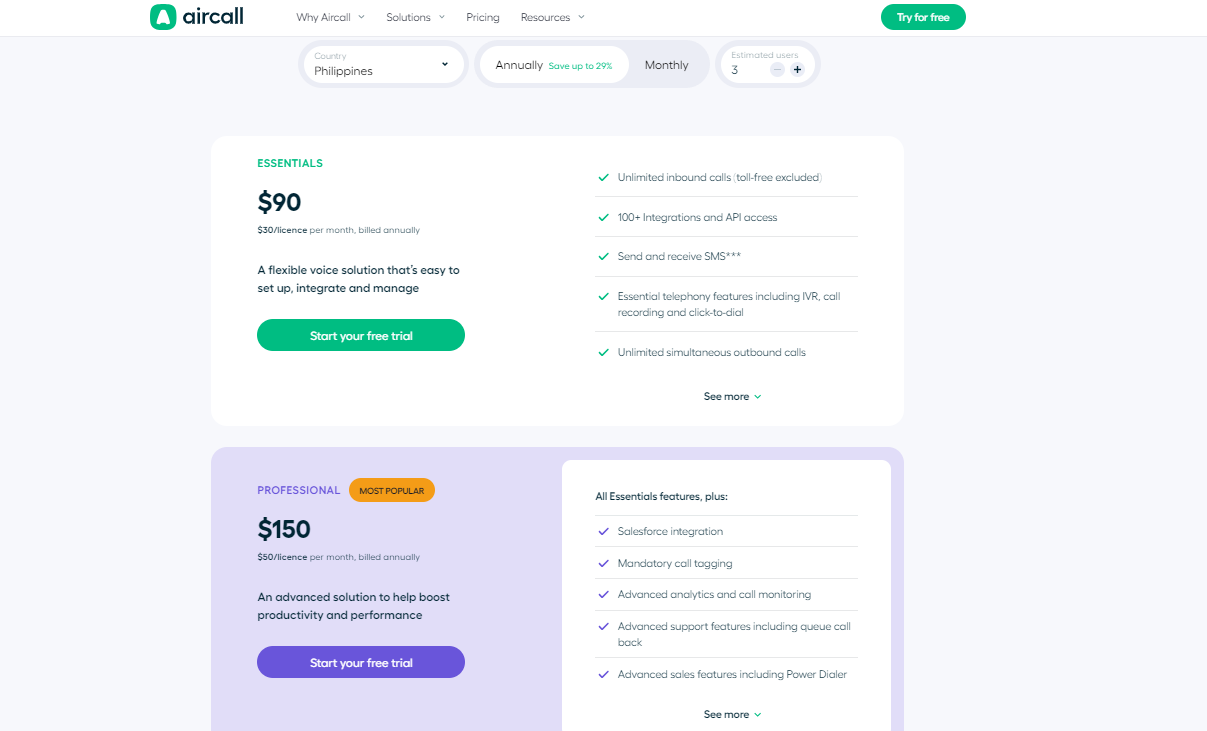What is Aircall?
Aircall is a cloud-based phone system designed to facilitate voice communication for businesses. Unlike traditional phone lines, Aircall utilizes the internet to transmit voice data, making it a more flexible and versatile communication tool. Founded in 2014, Aircall’s mission has been to revolutionize business telephony by empowering companies with a phone system that is intuitive, efficient, and global.
Aircall is a cloud-based phone system, which means that it leverages the power of the internet for voice communication. Unlike traditional phone systems that rely on physical telephone lines, Aircall only requires an internet connection. This not only streamlines the telephony system but also provides an array of features making it remarkably versatile.
How Does Aircall Work?
Aircall operates by utilizing Voice over Internet Protocol (VoIP) technology. Rather than using traditional telephone lines, VoIP converts voice into digital signals and sends them over the internet. This cloud-based telephony enables businesses to make and receive calls from anywhere as long as there is an internet connection. Aircall further enhances this technology by providing a range of features tailored for business communication, including integrations, analytics, and call recording.
Understanding the technology behind Aircall can help users make the most of its capabilities. As mentioned earlier, Aircall operates using Voice over Internet Protocol (VoIP) technology. Let’s dive deeper into how this technology powers Aircall.
Voice over Internet Protocol, or VoIP, is a technology that enables voice communications to be transmitted via the Internet rather than through conventional telephone lines. When you speak during a call, your voice is made up of sound waves. In traditional telephony, these sound waves are sent over telephone lines in their analog form. In contrast, VoIP technology converts these sound waves into digital signals, which are then sent over the internet.
Here’s how Aircall utilizes VoIP technology step-by-step:
- Voice Conversion: When you make a call using Aircall, your voice is immediately converted from analog sound waves into digital data packets.
- Data Transmission: These data packets are then sent over the internet to the recipient. Aircall’s cloud-based infrastructure ensures that this data is transmitted efficiently, ensuring minimal latency and high-quality audio.
- Voice Reconstruction: At the recipient’s end, these data packets are reconverted into analog sound waves so that the recipient can hear your voice.
- Call Management: Throughout this process, Aircall’s system manages the call, ensuring that data is transmitted properly and that the call remains stable and clear.
Key Features of Aircall that Make it Reliable Internationally
Global Reach and Local Presence
Aircall allows businesses to establish phone numbers in over 100 countries, ensuring a global reach. Moreover, Aircall enables businesses to display local numbers to the called parties, even when calling from a different country. This feature is essential for establishing trust and rapport with international clients, as they are more likely to respond to a local number.
Call Quality and Reliability
One of Aircall’s significant advantages is its high-definition call quality. Through advanced codecs and networking practices, Aircall ensures that voice communication is crystal clear. Moreover, Aircall has a robust infrastructure that reduces call drops and ensures a high level of reliability, making it a trusted choice for critical business communications.
Scalability and Flexibility
Aircall’s cloud-based architecture allows for easy scalability. As a business grows, additional lines and features can be added without the need for complicated hardware installations. Additionally, Aircall’s system can be customized to suit various business needs, including call routing, auto-attendant, and on-hold messages.
Integrations and Productivity Tools
Aircall boasts integration with various CRM systems and productivity tools, including Salesforce, HubSpot, and Slack. These integrations enable streamlined communication processes, as customer data and call histories can be accessed in real-time during calls. This capability enhances customer service and increases staff productivity.
The Costs and Return on Investment
Aircall Pricing Structure
Aircall offers different pricing tiers to cater to various business sizes and needs. Each tier includes a set of features and services, with higher tiers offering more advanced options. The pricing structure is transparent and can be consulted on Aircall’s official website.
Comparing Aircall to Traditional Phone Systems
When compared to traditional phone systems, Aircall often emerges as the more cost-effective solution, especially for international calling. Traditional systems often have high international calling rates and require expensive hardware. In contrast, Aircall’s cloud-based system eliminates the need for hardware and offers competitive international calling rates.
The ROI of Using Aircall
Businesses using Aircall often experience a significant return on investment. Reduced communication costs, improved customer service, and increased staff productivity contribute to this ROI. Client case studies and success stories featured on Aircall’s website provide practical examples of how businesses have benefited from using their services.
Best Practices for Utilizing Aircall
Setting up Your Aircall Account
To harness the full potential of Aircall, it’s essential to properly set up your account. Here is a step-by-step guide to setting up an Aircall account:
- Sign Up: Visit Aircall’s website and sign up using your business email. You’ll be asked to provide basic information about your business.
- Choose a Pricing Plan: Aircall offers various pricing plans catering to different business needs. Evaluate the features of each plan and choose the one that best aligns with your requirements.
- Select Phone Numbers: Aircall allows you to have local numbers from over 100 countries. Select the phone numbers that you wish to use. This could be your existing numbers (ported to Aircall) or new ones.
- Configure Settings: Customize your Aircall settings according to your business needs. Set up call routing to ensure calls are directed to the right person or team. You can also configure opening hours, voicemail, and on-hold music.
- Integrate With Other Tools: If your business uses CRM, helpdesk, or other communication tools, integrate them with Aircall to streamline your workflows.
- Optimization Consultation: It’s a good idea to consult Aircall’s support documentation for best practices in setting up your account. Additionally, you can contact their support team for personalized advice on optimizing settings for your specific needs.
Training Your Team on Aircall
Once your Aircall account is set up, the next critical step is to ensure that your team knows how to use it effectively. Proper training is crucial for maximizing the benefits of Aircall. Here are some steps you can take to train your team:
- Provide Access to Resources: Aircall has a rich knowledge base and tutorials that can be invaluable for new users. Provide your team with access to these resources so they can learn at their own pace.
- Conduct Training Sessions: Schedule training sessions where you can walk your team through the basic features of Aircall. Use real-world scenarios that are relevant to your business to make the training more impactful.
- Arrange Webinars: You can also arrange webinars with Aircall experts or utilize Aircall’s own webinars to provide your team with in-depth knowledge.
- Monitor and Provide Feedback: Initially, monitor how your team is using Aircall and provide feedback and tips for improvement.
- Encourage Open Communication: Encourage your team members to share any challenges or questions they might have regarding using Aircall. This can be done through regular check-ins or by having an open-door policy.
Comparison of Aircall with Other Generic International Call Solutions
| Features | Aircall | Other International Call Solutions |
| Technology | Cloud-based (VoIP) | Maybe cloud-based or traditional |
| Scalability | Highly scalable with easy user management | May vary |
| Global Reach | Local numbers in over 100 countries | Limited in some solutions |
| Integrations | Integrates with multiple CRMs and tools | Limited integrations |
| Analytics | Detailed call analytics and reporting | Basic or no analytics |
| Call Recording | Available | May or may not be available |
| Customization | Highly customizable settings | Limited customization options |
| Cost | Predictable pricing tiers with various features | May have variable costs |
| Customer Support | Comprehensive support and documentation | Quality of support may vary |
| Multi-Device Compatibility | Supports computers, smartphones, and desk phones | May be limited to specific devices |
Conclusion
Aircall stands out as a reliable solution for international calls owing to its global reach, high-quality call services, scalability, integrations, and cost-effectiveness. By adopting Aircall, businesses can streamline their communication processes and focus on growth and customer satisfaction. If international communication is pivotal to your business, it’s high time to explore Aircall as a robust communication solution.
Moreover, to fully leverage the capabilities of Aircall and integrate it seamlessly into your business operations, consider partnering with Ubique Digital Solutions. Ubique Digital Solutions offers expertise in digital transformation and can assist you in optimizing your Aircall setup and integrating it with other tools to create a cohesive communication strategy. Take your business to new heights by enhancing communication and improving customer experiences. Contact Ubique Digital Solutions Now.
FAQs
Q: How does Aircall differ from traditional phone systems?
Aircall operates over the internet, making it more flexible, scalable, and cost-effective compared to traditional phone systems that rely on telephone lines.
Q: How does Aircall ensure call quality and reliability?
Aircall employs advanced codecs and has a robust infrastructure to ensure high-definition call quality and reliable connections.
Q: Is Aircall cost-effective for small businesses?
Yes, Aircall’s scalable pricing tiers and reduced communication costs make it a cost-effective solution for businesses of all sizes, including small businesses.
Q: How can Aircall integrate with my existing CRM system?
Aircall offers integration with various CRM systems such as Salesforce and HubSpot. Integration can be set up through the Aircall dashboard by following the provided instructions.














